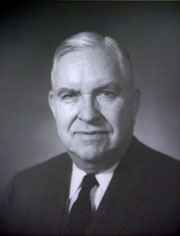Erwin Griswold
| Erwin Griswold | |
|---|---|
 |
|
| 34th United States Solicitor General | |
|
In office October 1967 – March 21, 1973 |
|
| President |
Lyndon B. Johnson Richard M. Nixon |
| Preceded by | Thurgood Marshall |
| Succeeded by | Robert Bork |
| 6th Dean of Harvard Law School | |
|
In office 1946–1967 |
|
| Preceded by | James M. Landis |
| Succeeded by | Derek Bok |
| Personal details | |
| Born |
Erwin Nathaniel Griswold July 14, 1904 East Cleveland, Ohio |
| Died | November 19, 1994 (aged 90) Boston, Massachusetts |
| Political party | Republican |
| Alma mater |
Oberlin College (A.B., M.A.) Harvard Law School (LL.B., S.J.D.) |
Erwin Nathaniel Griswold (July 14, 1904 – November 19, 1994) was an appellate attorney who argued many cases before the U.S. Supreme Court. Griswold served as Solicitor General of the United States (1967–1973) under Presidents Lyndon B. Johnson and Richard M. Nixon. He also served as Dean of Harvard Law School for 21 years. Several times he was considered for appointment to the U.S. Supreme Court. During a career that spanned more than six decades, he served as member of the U.S. Commission on Civil Rights and as President of the American Bar Foundation.
Griswold was born to James Harlen and Hope (Erwin) in East Cleveland, Ohio. Griswold graduated from Oberlin College in 1925 with an A.B. in mathematics and an M.A. in political science. He attended Harvard Law School from 1925 to 1929, earning an LL.B. summa cum laude in 1928 and an S.J.D. degree in 1929. Used by law professionals in all but four of the United States, The Bluebook, a uniform system of legal citation, was first compiled in 1926 by Griswold, while a student at HLS.
In 1929, Griswold was admitted to the Ohio bar and spent six weeks working as a partner in his father's Cleveland law firm of Griswold, Green, Palmer & Hadden. He subsequently joined the U.S. Office of the Solicitor General as a staff attorney and served as a special assistant to the attorney general from 1929-1934. There he worked under Solicitor General Charles Evans Hughes, Jr., son of the future Chief Justice of the United States, Charles Evans Hughes, Sr. He became an expert at arguing tax cases before the Supreme Court, and is considered one of the great scholars in tax law.
...
Wikipedia
